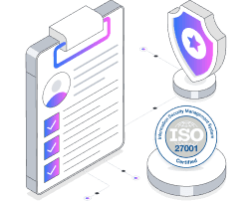What Is Information Security Compliance and How to Implement it?
Information security compliance is a proven way that ensure your organization’s sensitive data is protected from security incidents. Think about how much information an organization handles daily. From emails, employee records, and customer transactions, each of these are critical to the business and need to be secured. According to Forbes, 353 million people were affected by data breaches in 2023 alone. Additionally, according to IBM, the average cost of a data breach is said to be USD 4.45 million. So, to save organizations from costly breaches and penalties, various regulatory bodies have created data protection laws that they need to comply with. In this blog, we are going to discuss these compliances and how they can be achieved. What is Information Security Compliance? Information security compliance means adhering to industry-specific laws and standards that ensure sensitive data is protected. These standards or rules are established by a third party, which businesses need to comply with, or else face legal fines and penalties, along with loss of reputation. Compliance requirements differ according to the industry, location, and data type. For example, in the US, healthcare providers are required to comply with the Health Insurance Portability and Accountability Act (HIPAA), while businesses that manage credit card details should meet the Payment Card Industry Data Security Standard (PCI DSS). Organizations can achieve this compliance and protect their sensitive information from unauthorized access and data breaches by conducting a series of assessments, such as vulnerability scanning, penetration testing, and routine audits. Why is Information Security Compliance Important? Apart from the obvious benefit that it ensures the safety of an organization’s data, information security compliance also helps protect the company’s reputation and maintains the legitimacy of its operations, which can ultimately impact the company’s revenue. According to PwC, 85% of customers said they won’t do business with a company that cannot guarantee data security. While large enterprises can handle some reputational damage, it can be challenging for small or medium-sized businesses to overcome them. So, by complying with the information security standards, organizations can improve their current security measures that not only protect the data but also help to enhance it. 1. Protect Sensitive Data Information security compliance programs provide some of the most effective strategies to protect an organization’s sensitive data. This may include implementing encryption, access control measures, and firewalls. 2. Avoid Non-Compliance Fines and Penalties Certain industries and regions impose significant fines, criminal charges, and other penalties for not complying with data protection laws. For example, the European Union data privacy and security law fines up to €20 million or 4% of the organization’s global annual revenue for not complying with GDPR. 3. Build Customer Trust Businesses want their new and existing customers to trust them, but if they lose control of customer data, that trust can be easily destroyed. Organizations must ensure that they have adequate security measures, including security testing, to keep their confidential information safe and information security compliance is the best way to do that. 4. Create a Competitive Advantage A compliance certificate proves that an organization commits to investing in the security of its customer data. This is especially necessary for highly regulated industries, such as fintech and healthcare. It also helps the investors and customers trust your brand more, giving you a competitive advantage. What are the Compliance Standards for Information Security? There are hundreds of standards for information security worldwide. However, here are a few major ones: 1. SOC 2 SOC 2 or Service Organization Control Type 2 is created by the American Institute of CPAs (AICPA), for service organizations, which outlines how organizations should manage client data. They need to follow the Trust Services criteria, which include security, availability, processing integrity, confidentiality, and privacy. 2. HIPAA HIPAA or Health Insurance Portability and Accountability Act was established by the US Department of Health and Human Services (HHS). It provides guidelines to protect private patient health information (PHI). The HIPAA Privacy Rule guarantees the secure transmission of health information to promote quality healthcare. 3. GDPR GDPR or General Data Protection Regulation is one of the major data protection laws of the European law governing online privacy. According to this standard, any organization that handles an EU resident’s data follows the strict guidelines mentioned. Additionally, those who collect and manage this data are also required to protect it against misuse and exploitation. 4. ISO 27001 Released by the International Electrotechnical Commission (IEC), the International Organisation for Standardisation (ISO) is one of the most recognized international standards for information security. It gives businesses the knowledge they need to protect their most valuable data, such as customer information, financial records, and intellectual property. What are the Legal Requirements of Information Security Compliance? The legal requirements of information security compliance change depending on the relevant standard and the jurisdiction. However, here are some general requirements. 1. Data Protection Laws Data protection laws regulate the collection, use, transfer, and disclosure of personal information and its security. People are given access to their data, companies that protect it are given accountability requirements, and in case of improper or harmful processing of the data, remedies are provided. 2. Data Breach Notification Laws It outlines who the compliance rules apply to, such as individuals, organizations, or authorities, and what constitutes a breach. These rules mandate that the organization that experienced a breach is mandated to notify the individual whose data was compromised, in addition with all other important parties. 3. Data Retention and Destruction Data retention means keeping various kinds of data for a specified amount of time. The practice of data destruction (sifting and shredding) is no longer valuable to the organization. These data security policies govern how personal data is gathered, preserved, or erased. 4. Contractual Requirements Organizations having contractual agreements with clients, business partners, or suppliers might be imposed with specific information security standards. These agreements could have policies related to security audits, incident response, data confidentiality, and protection. What are the Different Types of Information Security? These are the




